人教版英语七下Unit10 I’d like some noodles. Section A 2d-3c (共39张PPT)
文档属性
| 名称 | 人教版英语七下Unit10 I’d like some noodles. Section A 2d-3c (共39张PPT) |
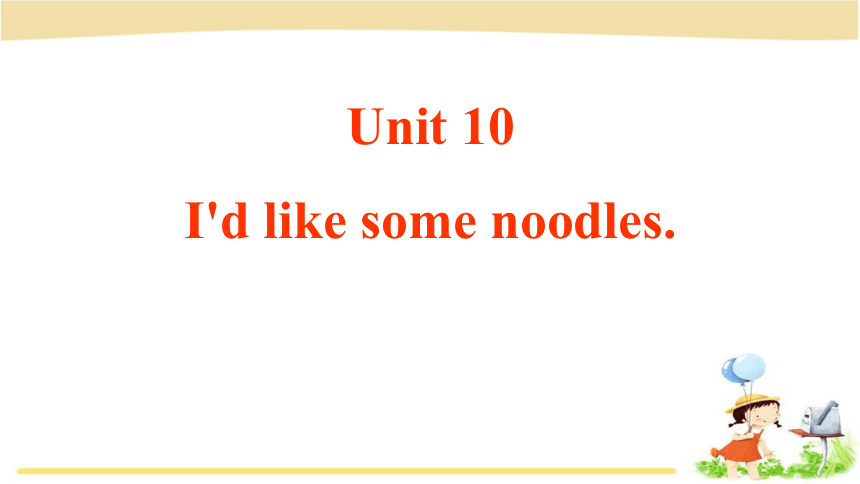
|
|
| 格式 | zip | ||
| 文件大小 | 3.4MB | ||
| 资源类型 | 教案 | ||
| 版本资源 | 人教新目标(Go for it)版 | ||
| 科目 | 英语 | ||
| 更新时间 | 2020-06-06 00:00:00 | ||
图片预览

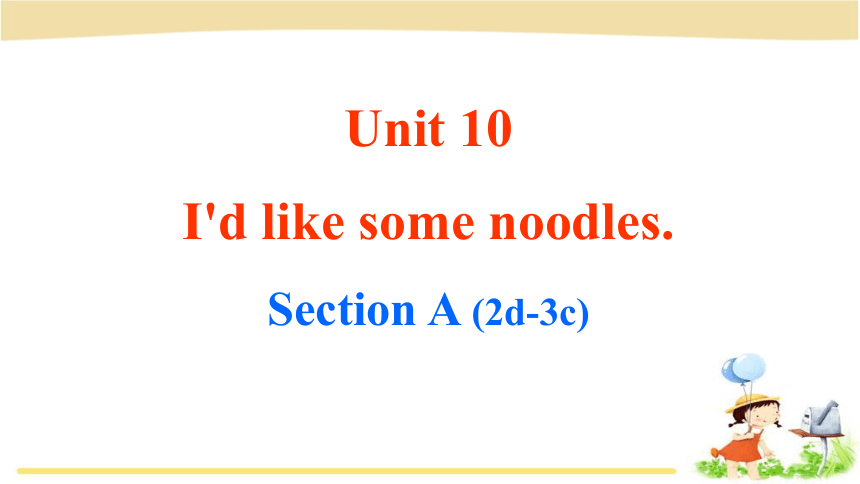
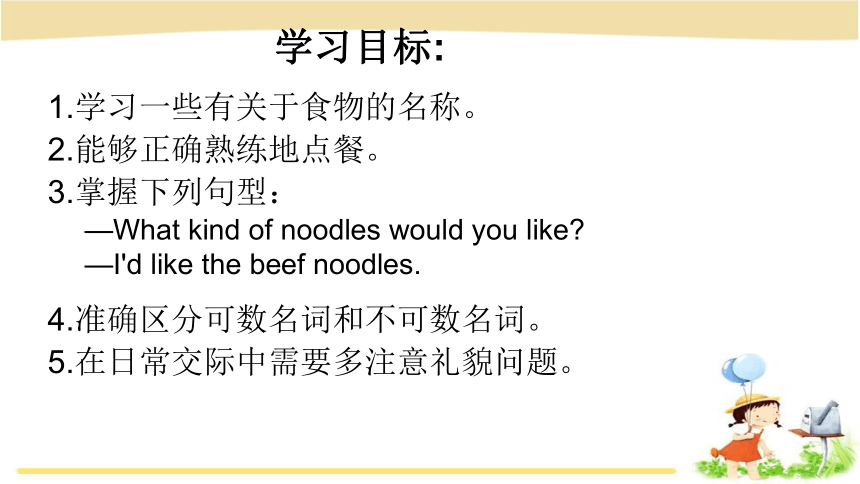
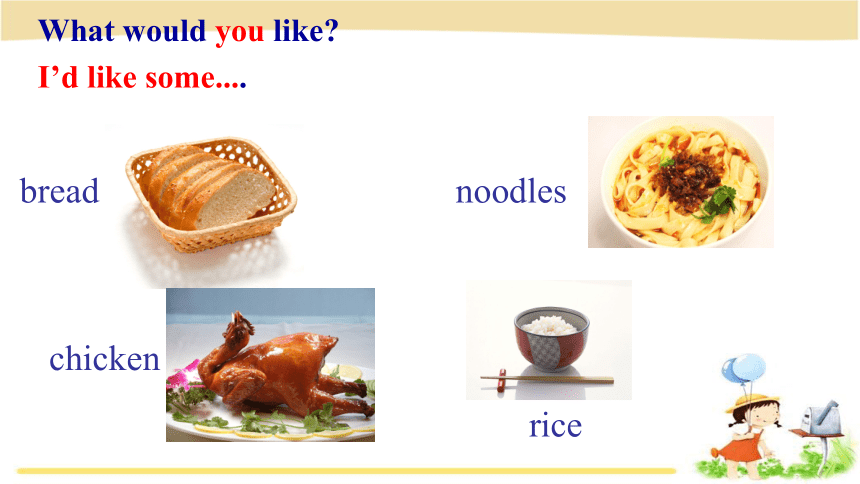
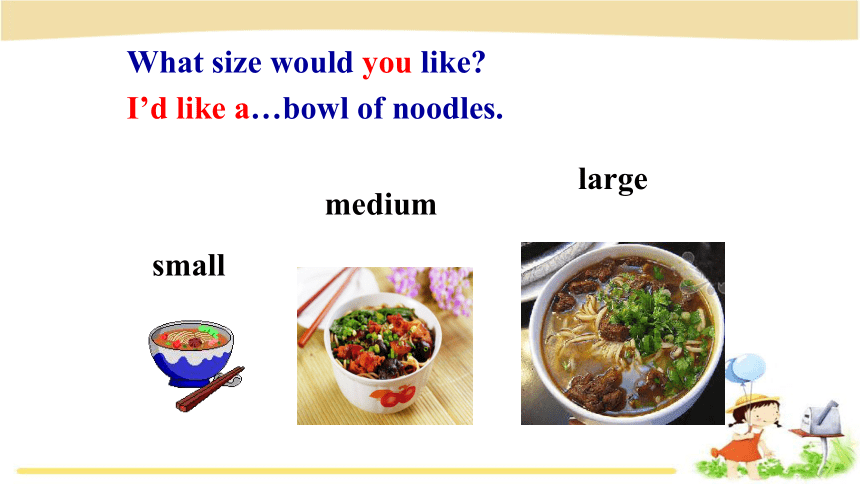


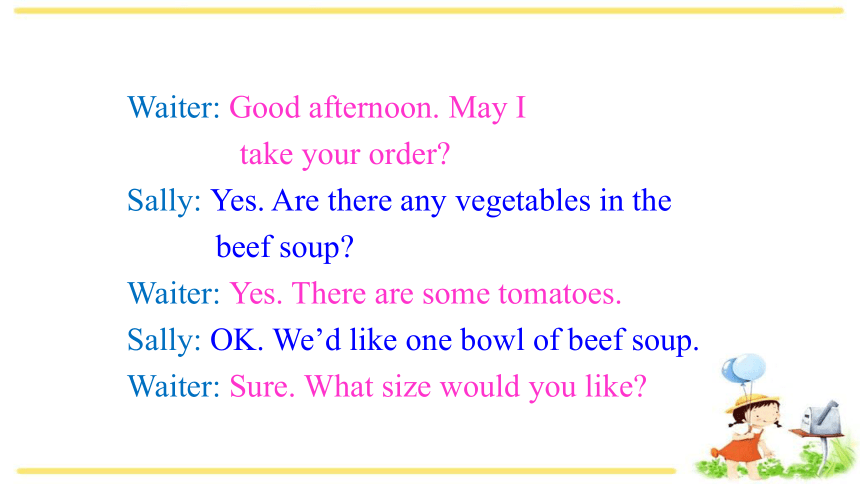
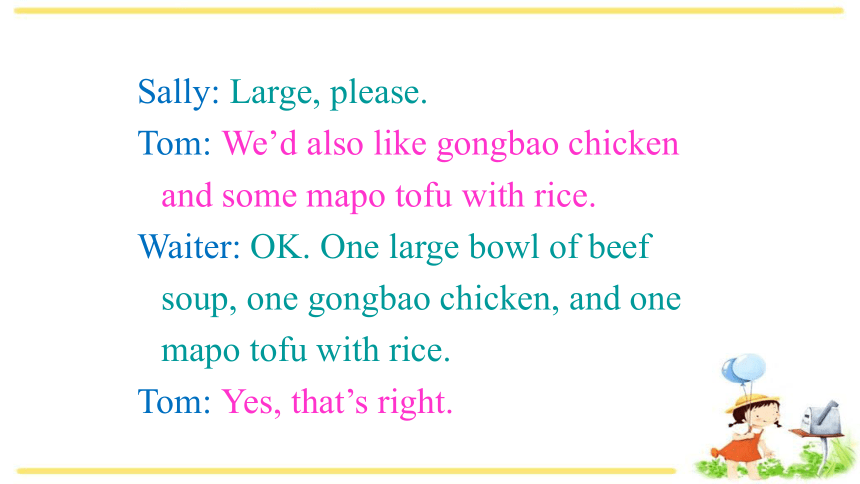
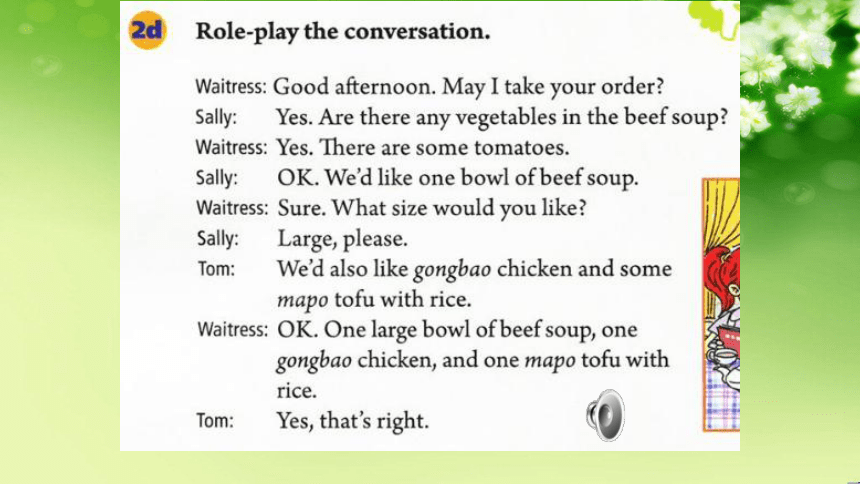
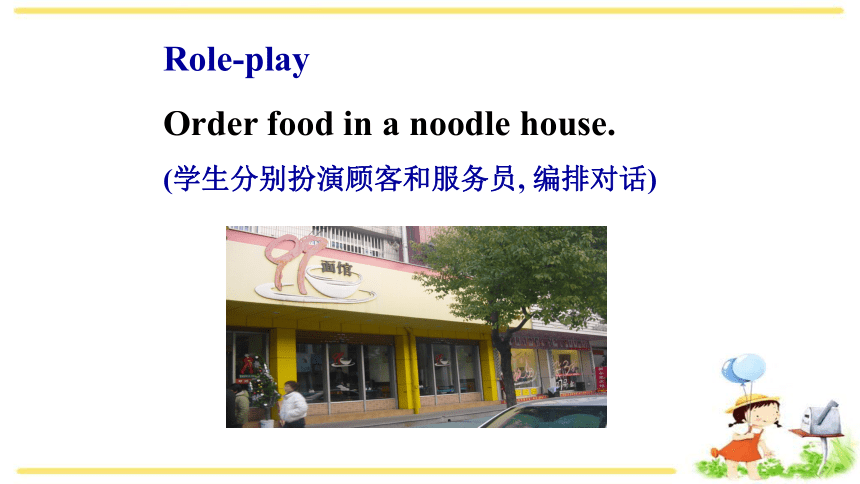
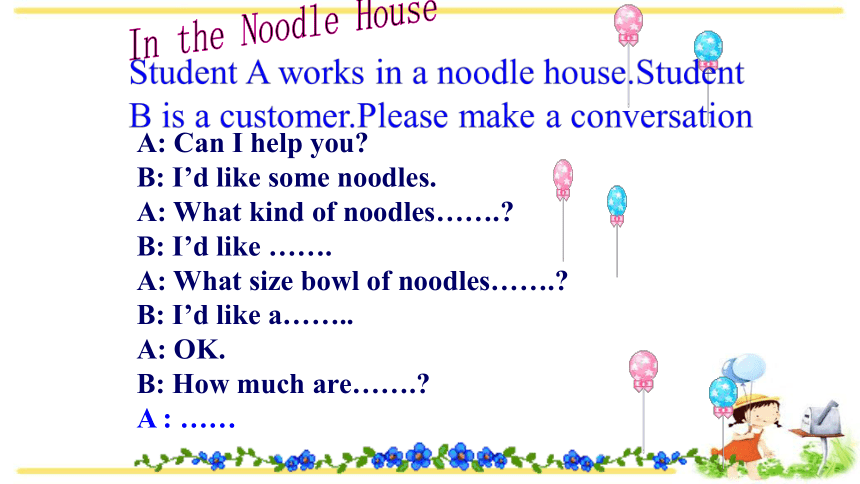
文档简介
(共39张PPT)
Unit
10
I'd
like
some
noodles.
Unit
10
I'd
like
some
noodles.
Section
A
(2d-3c)
学习目标:
1.学习一些有关于食物的名称。
2.能够正确熟练地点餐。
3.掌握下列句型:
4.准确区分可数名词和不可数名词。
5.在日常交际中需要多注意礼貌问题。
—What
kind
of
noodles
would
you
like?
—I'd
like
the
beef
noodles.
bread
noodles
rice
chicken
What
would
you
like?
I’d
like
some....
small
medium
large
What
size
would
you
like?
I’d
like
a…bowl
of
noodles.
2d
Role-play
the
conversation.
Questions
1
What
would
Sally
and
Tom
like
to
eat?
2
How
many
bowls
of
soup
would
Sally
and
Tom
like
to
have
?
3
What
size
would
they
like?
Waiter:
Good
afternoon.
May
I
take
your
order?
Sally:
Yes.
Are
there
any
vegetables
in
the
beef
soup?
Waiter:
Yes.
There
are
some
tomatoes.
Sally:
OK.
We’d
like
one
bowl
of
beef
soup.
Waiter:
Sure.
What
size
would
you
like?
Sally:
Large,
please.
Tom:
We’d
also
like
gongbao
chicken
and
some
mapo
tofu
with
rice.
Waiter:
OK.
One
large
bowl
of
beef
soup,
one
gongbao
chicken,
and
one
mapo
tofu
with
rice.
Tom:
Yes,
that’s
right.
Role-play
Order
food
in
a
noodle
house.
(学生分别扮演顾客和服务员,
编排对话)
A:
Can
I
help
you?
B:
I’d
like
some
noodles.
A:
What
kind
of
noodles…….?
B:
I’d
like
…….
A:
What
size
bowl
of
noodles…….?
B:
I’d
like
a……..
A:
OK.
B:
How
much
are…….?
A
:
……
In
the
Noodle
House
Countable
nouns
Uncountable
nouns
Countable
and
Uncountable
nouns
bowls,
apples,
oranges,
strawberries
beef,
meat,
milk,
mutton,
water
chicken,
salad,
ice-cream,
cabbage
Countable
nouns
Uncountable
nouns
tomatoes
onions
strawberries
eggs
oranges
carrots
bananas
beef
pork
mutton
chicken
potatoes
apples
a
piece
of
rice
porridge
vegetable
soup
fish
soup
a
bowl
of
orange
juice
green
tea
milk
water
two
glasses
of
可数名词和不可数名词
可数名词:
可以计数的名词称为可数名词。
一般有
单数与复数两种形式,
前面可加a,
an或数词来修饰.
不可数名词:
不可计数的名词称为不可数名词。
没有复数形式,
前面不能用不定冠词a,
an,
也不能
直接加数词,
但可以跟某些量词短语搭配,
表示数量。如:
a
glass
of
water,
two
cups
of
tea.
1.
_______
potato
_______
beef
3.
________
milk
4.
________
strawberry
5.
________
chicken
6.
________
egg
7.
________
mutton
8.
________
apple
9.
________
tomato
10.
______
noodles
用
a,
an或
some填空。
a
some
some
a
some
an
some
an
a
some
1.
dumpling
__________
apple_______
2.
box
______
watch
_______
3.
leaf
_____
thief
_______
4.
country
_________
strawberry
____________
5.
policeman
__________
woman
_______
6.
potato
________
tomato
_________
写出下列可数名词的复数形式
dumplings
apples
boxes
watches
countries
strawberries
policemen
women
potatoes
tomatoes
leaves
thieves
3a.
Complete
the
conversation
below.
1.
May
I
have
your
order?___
2.
What
kind
of
noodles
would
you
like?____
3.
We
have
beef,
chicken,
mutton,
cabbage,
potato,
tomato…____
4.
Yes,
there
are
some
carrots.___
5.
Sure.
What
size
would
you
like?____
6.
We
have
large,
medium
and
small
bowls.____
A:
What
kind
of
noodles
do
you
have?
B:
Oh,
a
medium
bowl,
please.
C:
OK,
I’d
like
the
mutton
noodles
then.
D:
I’d
like
some
noodles,
please.
E:
What
sizes
do
you
have?
F:
Are
there
any
vegetables
in
the
mutton
noodles?
D
A
F
C
E
B
3b.
Write
questions
and
answers
using
the
words
in
brackets.
1.
What
kind
of
noodles
would
you
like?
(kind)
________________________________________
__________________________________________
(chicken
/
beef
/
tomatoes)
I’d
like
chicken,
beef
and
tomato
noodles.
/
I’d
like
chicken
and
beef
noodles
with
tomatoes.
2._____________________________________
(size)
_______________________________________
(medium)
3._____________________________________
(any
/
cabbage
/
beef
noodles)
______________________________________
(no)
Is
there
any
cabbage
in
the
beef
noodles?
No,
there
isn’t
any.
What
size
would
you
like?
I’d
like
a
medium
bowl,
please.
3c.
Work
in
small
groups.
Find
out
who
would
like
the
food
below.
Write
their
names
on
the
cards
above
the
food.
A:
Anna,
what
would
you
like
to
eat?
B:
I’d
like
beef
noodles
with
carrots.
4.
Make
a
survey
Names
kind
of
noodles
size
bowl
of
noodles
I’d
like
…
He’d/She’d
like…
Give
a
report
like
this:
1.
What
kind
of
noodles
would
you
like?
kind
在此句中作“种类”讲,a
kind
of
“一种”,
all
kinds
of
“各种各样的”。
比一比:kind
of
“有几分”
A
cat
is
a
kind
of
animal.
The
cat
is
kind
of
smart.
Language
Points
2.
May
I
take
your
order?/Can
I
help
you?
1)
这都是服务用语,
可根据不同的服务场合翻译成不
同的意思。如:
在餐馆,
都可以用,翻译成:
“你想吃
点什么?”
,
在商店,
用后者,则是“你想买点什么?”
2)
类似的服务用语还有What
can
I
do
for
you?
此句
的本义为:
“我能为你做点什么?”它与Can
I
help
you?
是同义句。
3.
What
size
would
you
like?
你要多大的?
size
n.
(尺寸、体积、规模、身材等的)大小;
(数量的)多少;(衣服、鞋帽的)尺码
e.g.
take
the
size
of
a
box
量箱子的尺寸
houses
of
all
sizes
大大小小的房子
boys
of
all
the
same
size
一样个头的男孩子们
What
size
of
shoes
do
you
want?
你要多大号码的鞋子?
4.
We
have
large,
medium
and
small
bowls.
1)
large
adj.
“(形状、面积、数量等方面)
大的,
巨大的
”
e.g.
a
large
mouth
一张大嘴
a
large
office
一间宽敞的办公室
2)
big
adj.
“(面积、体积、数量、规模、程度
等方面)大的,
巨大的
”
e.g.
a
big
city
一个大城市
a
big
pie
tree
高大的松树
some和any
既可以修饰可数名词又可以修
饰不可数名词,
some常用在肯定句中,
而
any则常用在否定和疑问句中。所以,
some
和
any
的区别在于:
some和any
的用法主要
是考虑用在肯定句、疑问句还是否定句中,
与名词的可数与否无关。
Language
points
some和any的用法
1
some的用法:
some意为“一些”,可作形
容词和代词。它常修饰可数名词复数。
如:some
books
一些书,
some
boys
一些男孩,
也可修饰不可数名词:
some
water
一些水,some
tea
一些茶叶,
2
some
常用在肯定句中。
any的用法:
any意为“任何一些”,它也
可修饰可数名词复数或不可数名词,常
用于疑问句和否定句。如:
I
can’t
see
any
tea.
我没看见茶叶。
Do
you
have
any
friends
at
school?
你在学校有些朋友吗?
3
但在表示建议,反问,请求的疑问句中,或
期望得到肯定回答时,多用some而不用any。
如:Would
you
like
some
coffee?
你要不要来点咖啡?
How
about
some
fruit
juice?
来点水果汁如何?
4
5
当any表示“任何”的意义,起强调作用时,
它可以用在肯定句中;
如:Any
student
can
answer
this
question.
任何学生都可以回答这个问题。
Exercises
1.
I’d
like
mutton
and
potato
noodles.
(对划线部分提问)
_____
____
__
noodles
would
you
like?
请按要求完成句子,
每空一词
(含缩写)。
What
kind
of
1.
Would
you
like
_____
hot
soup?
A.
little
B.
much
C.
some
D.
any
2.
--Would
you
like
to
come
to
dinner
today?
--I’d
like
to,
_____
I’m
too
busy.
A.
and
B.
so
C.
but
D.
as
3.
Mario
likes
_____
cold
hot
dogs.
A.
eat
B.
eating
C.
ate
D.
is
eating
c
c
B
单项选择
4.
I
would
like
____
in
my
noodles.
A.
tomatoes
and
mutton
B.
tomatoes
and
muttons
C.
tomato
and
mutton
D.
tomato
and
muttons
5.
They
would
like
_____
noodles.
A.
tomatoes
and
mutton
B.
tomatoes
and
muttons
C.
tomato
and
mutton
D.
tomato
and
muttons
6.
--
Bob,
would
you
like
to
come
to
the
party?
--
________.
A.
Yes,
I
would.
B.
Yes,
I’d
love
to.
C.
No,
I
wouldn’t.
D.
No,
I
don’t.
A
C
B
7.
—Ben,
would
you
like
to
play
football
with
us?
—
________,
but
I
have
to
wash
the
dishes
first.?
(2008
重庆市)
A.
No,
I
can’t?
B.
I
don’t
want
to?
?
?C.
Yes,
please?
?
?
D.
I’d
like
to?
D
Summary
Make
a
survey
about
your
parents'
eating
habits,
and
talk
about
it.
Thank
you!
Unit
10
I'd
like
some
noodles.
Unit
10
I'd
like
some
noodles.
Section
A
(2d-3c)
学习目标:
1.学习一些有关于食物的名称。
2.能够正确熟练地点餐。
3.掌握下列句型:
4.准确区分可数名词和不可数名词。
5.在日常交际中需要多注意礼貌问题。
—What
kind
of
noodles
would
you
like?
—I'd
like
the
beef
noodles.
bread
noodles
rice
chicken
What
would
you
like?
I’d
like
some....
small
medium
large
What
size
would
you
like?
I’d
like
a…bowl
of
noodles.
2d
Role-play
the
conversation.
Questions
1
What
would
Sally
and
Tom
like
to
eat?
2
How
many
bowls
of
soup
would
Sally
and
Tom
like
to
have
?
3
What
size
would
they
like?
Waiter:
Good
afternoon.
May
I
take
your
order?
Sally:
Yes.
Are
there
any
vegetables
in
the
beef
soup?
Waiter:
Yes.
There
are
some
tomatoes.
Sally:
OK.
We’d
like
one
bowl
of
beef
soup.
Waiter:
Sure.
What
size
would
you
like?
Sally:
Large,
please.
Tom:
We’d
also
like
gongbao
chicken
and
some
mapo
tofu
with
rice.
Waiter:
OK.
One
large
bowl
of
beef
soup,
one
gongbao
chicken,
and
one
mapo
tofu
with
rice.
Tom:
Yes,
that’s
right.
Role-play
Order
food
in
a
noodle
house.
(学生分别扮演顾客和服务员,
编排对话)
A:
Can
I
help
you?
B:
I’d
like
some
noodles.
A:
What
kind
of
noodles…….?
B:
I’d
like
…….
A:
What
size
bowl
of
noodles…….?
B:
I’d
like
a……..
A:
OK.
B:
How
much
are…….?
A
:
……
In
the
Noodle
House
Countable
nouns
Uncountable
nouns
Countable
and
Uncountable
nouns
bowls,
apples,
oranges,
strawberries
beef,
meat,
milk,
mutton,
water
chicken,
salad,
ice-cream,
cabbage
Countable
nouns
Uncountable
nouns
tomatoes
onions
strawberries
eggs
oranges
carrots
bananas
beef
pork
mutton
chicken
potatoes
apples
a
piece
of
rice
porridge
vegetable
soup
fish
soup
a
bowl
of
orange
juice
green
tea
milk
water
two
glasses
of
可数名词和不可数名词
可数名词:
可以计数的名词称为可数名词。
一般有
单数与复数两种形式,
前面可加a,
an或数词来修饰.
不可数名词:
不可计数的名词称为不可数名词。
没有复数形式,
前面不能用不定冠词a,
an,
也不能
直接加数词,
但可以跟某些量词短语搭配,
表示数量。如:
a
glass
of
water,
two
cups
of
tea.
1.
_______
potato
_______
beef
3.
________
milk
4.
________
strawberry
5.
________
chicken
6.
________
egg
7.
________
mutton
8.
________
apple
9.
________
tomato
10.
______
noodles
用
a,
an或
some填空。
a
some
some
a
some
an
some
an
a
some
1.
dumpling
__________
apple_______
2.
box
______
watch
_______
3.
leaf
_____
thief
_______
4.
country
_________
strawberry
____________
5.
policeman
__________
woman
_______
6.
potato
________
tomato
_________
写出下列可数名词的复数形式
dumplings
apples
boxes
watches
countries
strawberries
policemen
women
potatoes
tomatoes
leaves
thieves
3a.
Complete
the
conversation
below.
1.
May
I
have
your
order?___
2.
What
kind
of
noodles
would
you
like?____
3.
We
have
beef,
chicken,
mutton,
cabbage,
potato,
tomato…____
4.
Yes,
there
are
some
carrots.___
5.
Sure.
What
size
would
you
like?____
6.
We
have
large,
medium
and
small
bowls.____
A:
What
kind
of
noodles
do
you
have?
B:
Oh,
a
medium
bowl,
please.
C:
OK,
I’d
like
the
mutton
noodles
then.
D:
I’d
like
some
noodles,
please.
E:
What
sizes
do
you
have?
F:
Are
there
any
vegetables
in
the
mutton
noodles?
D
A
F
C
E
B
3b.
Write
questions
and
answers
using
the
words
in
brackets.
1.
What
kind
of
noodles
would
you
like?
(kind)
________________________________________
__________________________________________
(chicken
/
beef
/
tomatoes)
I’d
like
chicken,
beef
and
tomato
noodles.
/
I’d
like
chicken
and
beef
noodles
with
tomatoes.
2._____________________________________
(size)
_______________________________________
(medium)
3._____________________________________
(any
/
cabbage
/
beef
noodles)
______________________________________
(no)
Is
there
any
cabbage
in
the
beef
noodles?
No,
there
isn’t
any.
What
size
would
you
like?
I’d
like
a
medium
bowl,
please.
3c.
Work
in
small
groups.
Find
out
who
would
like
the
food
below.
Write
their
names
on
the
cards
above
the
food.
A:
Anna,
what
would
you
like
to
eat?
B:
I’d
like
beef
noodles
with
carrots.
4.
Make
a
survey
Names
kind
of
noodles
size
bowl
of
noodles
I’d
like
…
He’d/She’d
like…
Give
a
report
like
this:
1.
What
kind
of
noodles
would
you
like?
kind
在此句中作“种类”讲,a
kind
of
“一种”,
all
kinds
of
“各种各样的”。
比一比:kind
of
“有几分”
A
cat
is
a
kind
of
animal.
The
cat
is
kind
of
smart.
Language
Points
2.
May
I
take
your
order?/Can
I
help
you?
1)
这都是服务用语,
可根据不同的服务场合翻译成不
同的意思。如:
在餐馆,
都可以用,翻译成:
“你想吃
点什么?”
,
在商店,
用后者,则是“你想买点什么?”
2)
类似的服务用语还有What
can
I
do
for
you?
此句
的本义为:
“我能为你做点什么?”它与Can
I
help
you?
是同义句。
3.
What
size
would
you
like?
你要多大的?
size
n.
(尺寸、体积、规模、身材等的)大小;
(数量的)多少;(衣服、鞋帽的)尺码
e.g.
take
the
size
of
a
box
量箱子的尺寸
houses
of
all
sizes
大大小小的房子
boys
of
all
the
same
size
一样个头的男孩子们
What
size
of
shoes
do
you
want?
你要多大号码的鞋子?
4.
We
have
large,
medium
and
small
bowls.
1)
large
adj.
“(形状、面积、数量等方面)
大的,
巨大的
”
e.g.
a
large
mouth
一张大嘴
a
large
office
一间宽敞的办公室
2)
big
adj.
“(面积、体积、数量、规模、程度
等方面)大的,
巨大的
”
e.g.
a
big
city
一个大城市
a
big
pie
tree
高大的松树
some和any
既可以修饰可数名词又可以修
饰不可数名词,
some常用在肯定句中,
而
any则常用在否定和疑问句中。所以,
some
和
any
的区别在于:
some和any
的用法主要
是考虑用在肯定句、疑问句还是否定句中,
与名词的可数与否无关。
Language
points
some和any的用法
1
some的用法:
some意为“一些”,可作形
容词和代词。它常修饰可数名词复数。
如:some
books
一些书,
some
boys
一些男孩,
也可修饰不可数名词:
some
water
一些水,some
tea
一些茶叶,
2
some
常用在肯定句中。
any的用法:
any意为“任何一些”,它也
可修饰可数名词复数或不可数名词,常
用于疑问句和否定句。如:
I
can’t
see
any
tea.
我没看见茶叶。
Do
you
have
any
friends
at
school?
你在学校有些朋友吗?
3
但在表示建议,反问,请求的疑问句中,或
期望得到肯定回答时,多用some而不用any。
如:Would
you
like
some
coffee?
你要不要来点咖啡?
How
about
some
fruit
juice?
来点水果汁如何?
4
5
当any表示“任何”的意义,起强调作用时,
它可以用在肯定句中;
如:Any
student
can
answer
this
question.
任何学生都可以回答这个问题。
Exercises
1.
I’d
like
mutton
and
potato
noodles.
(对划线部分提问)
_____
____
__
noodles
would
you
like?
请按要求完成句子,
每空一词
(含缩写)。
What
kind
of
1.
Would
you
like
_____
hot
soup?
A.
little
B.
much
C.
some
D.
any
2.
--Would
you
like
to
come
to
dinner
today?
--I’d
like
to,
_____
I’m
too
busy.
A.
and
B.
so
C.
but
D.
as
3.
Mario
likes
_____
cold
hot
dogs.
A.
eat
B.
eating
C.
ate
D.
is
eating
c
c
B
单项选择
4.
I
would
like
____
in
my
noodles.
A.
tomatoes
and
mutton
B.
tomatoes
and
muttons
C.
tomato
and
mutton
D.
tomato
and
muttons
5.
They
would
like
_____
noodles.
A.
tomatoes
and
mutton
B.
tomatoes
and
muttons
C.
tomato
and
mutton
D.
tomato
and
muttons
6.
--
Bob,
would
you
like
to
come
to
the
party?
--
________.
A.
Yes,
I
would.
B.
Yes,
I’d
love
to.
C.
No,
I
wouldn’t.
D.
No,
I
don’t.
A
C
B
7.
—Ben,
would
you
like
to
play
football
with
us?
—
________,
but
I
have
to
wash
the
dishes
first.?
(2008
重庆市)
A.
No,
I
can’t?
B.
I
don’t
want
to?
?
?C.
Yes,
please?
?
?
D.
I’d
like
to?
D
Summary
Make
a
survey
about
your
parents'
eating
habits,
and
talk
about
it.
Thank
you!
同课章节目录
- Unit 1 Can you play the guitar?
- Section A
- Section B
- Unit 2 What time do you go to school?
- Section A
- Section B
- Unit 3 How do you get to school?
- Section A
- Section B
- Unit 4 Don't eat in class.
- Section A
- Section B
- Unit 5 Why do you like pandas?
- Section A
- Section B
- Unit 6 I'm watching TV.
- Section A
- Section B
- Review of Units 1-6
- Unit 7 It's raining!
- Section A
- Section B
- Unit 8 Is there a post office near here?
- Section A
- Section B
- Unit 9 What does he look like?
- Section A
- Section B
- Unit 10 I'd like some noodles.
- Section A
- Section B
- Unit 11 How was your school trip?
- Section A
- Section B
- Unit 12 What did you do last weekend?
- Section A
- Section B
